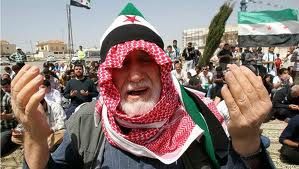
Beirut, April 7: At least 24 Syrians were killed in violence on Friday, opposition activists said, only four days before a troop pullback agreed by President Bashar al-Assad as part of a peace plan proposed by mediator Kofi Annan.
The Syrian Observatory for Human Rights said shelling had killed at least 10 people, including four rebel fighters, in the flashpoint central city of Homs. Two soldiers killed in separate clashes and one person was killed in the town of Douma, it said.
The British-based Observatory, using its network of contacts in Syria, also reported seven civilians and four soldiers killed in clashes and bombardments in Anadan, north of Aleppo.
The fresh violence erupted a day after U.N. Secretary-General Ban Ki-moon said the conflict was worsening and attacks on civilian areas persisted, despite assurances from Damascus that its troops had begun withdrawing under the peace plan.
Annan, who is mediating for the United Nations and the Arab League, has said both the government and opposition must stop fighting at 6 a.m. (0300 GMT) on April 12, if Damascus meets its deadline 48 hours earlier to pull back troops from cities and cease using heavy weapons in populated areas.
Assad’s opponents have accused the Syrian military of using the run-up to the ceasefire to intensify assaults. Syria has now charged insurgents with doing the same.
“In recent days terrorist acts committed by armed groups in Syria have escalated, especially since an understanding was reached on Kofi Annan’s plan,” it said in a letter to the United Nations released on Friday.
“The international community and the Security Council must take the necessary measures to prevent and stop the funding of any terrorist activities against Syria,” it said.
In the latest violence, activists reported tank fire in at least three urban centres on Friday - the town of Douma near Damascus, the restive city of Homs and Rastan, north of Homs.
“At least 5 tanks and 10 buses loaded with security men and Shabiha (pro-Assad militia) entered Douma,” one local activist said. “There has been shelling on Douma since the morning.”
In Rastan, an activist said Free Syrian Army rebels had confronted a morning tank thrust. “They blocked the advance and the Assad army left. Then artillery started,” he said.
Accounts of the violence are difficult to verify because Syria’s government restricts access to independent journalists.
REFUGEE EXODUS
Assad blames the conflict on foreign-backed “terrorists” and has proposed a parliamentary election on May 7 among other reforms. His opponents dismiss these as a sham, saying it is impossible to have a valid vote while bloodshed continues.
Anti-Assad demonstrations broke out after Friday prayers in the eastern province of Hasakeh, in the town of Qamishli and Deir al-Zor city, activists said. Protesters carried the white and green rebel flag. Some saluted other rebel cities.
Army shelling of villages in the northwestern province of Idlib has prompted a swelling exodus of refugees. Turkey said there were now 23,835 Syrian refugees on its territory.
Over 2,800 arrived on Thursday alone, a Turkish official said, more than double the highest previous one-day total.
They crossed near the Turkish village of Bukulmez and more were waiting to do so, the official said. Forty-four minibuses ferried the arrivals to a refugee camp at Reyhanli.
“The army is destroying buildings and bombing them till they turn to charcoal,” said Mohammed Khatib, a refugee who said he came from Kastanaz, a Syrian town of 20,000 people.
“The army wants people to move out of their houses. If the residents refuse, they destroy them with the people inside.”
Thousands of Syrians have also fled to Lebanon and Jordan. Host countries say they have taken in more than 50,000 since the revolt against 42 years of Assad family rule began a year ago.
Loyalist forces have killed more than 9,000 people during the unrest, according to a U.N. tally. Syria says 6,044 have died, including 2,566 soldiers and police.
Western powers are not convinced Assad will honour the promised truce and believe he may seek loopholes giving him more time to cripple the Free Syrian Army (FSA) and deter protesters.
It is also uncertain whether the FSA has enough control over its fighters to enforce Annan’s ceasefire deadline.
Syria’s U.N. ambassador Bashar Ja’afari said the plan did not require any pullback of police - who have played a big role in the conflict as suggested by the state’s own casualty toll.
Last year the opposition said troops had disguised themselves as police and repainted army vehicles in police colours before the arrival in December of Arab observers sent to monitor what proved an abortive Arab League peace plan.
A Norwegian general attached to U.N. peacekeeping arrived in Damascus on Thursday to examine prospects for an eventual U.N. ceasefire monitoring mission of up to 250 unarmed observers, something which would require a Security Council resolution.
The council, where Russia and China have vetoed two previous Syria resolutions, agreed on Thursday to a statement urging Damascus to meet Annan’s ceasefire deadline.








Comments
Add new comment